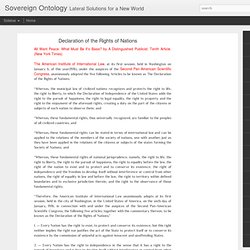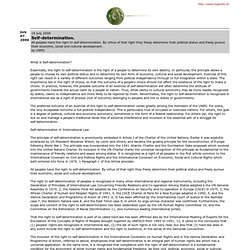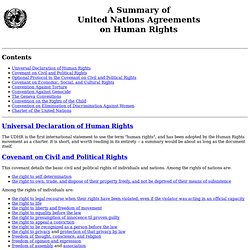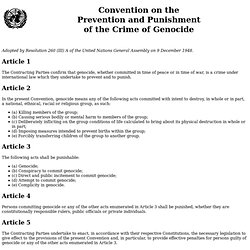

Declaration of the Rights of Nations. All Want Peace: What Must Be It's Basis?

By A Distinguished Publicist. Tenth Article. (New York Times) The American Institute of International Law , at its first session, held in Washington on January 6, of this year(1916), under the auspices of the Second Pan-American Scientific Congress , unanimously adopted the five following Articles to be known as The Declaration of the Rights of Nations: “Whereas, the municipal law of civilized nations recognizes and protects the right to life, the right to liberty, to which the Declaration of Independence of the United States adds the right to the pursuit of happiness, the right to legal equality, the right to property and the right to the enjoyment of the aforesaid rights, creating a duty on the part of the citizens or subjects of each nation to observe them; and. Carnegie Endowment for International Peace (pg 128,129) The Declaration of Principles of International Law Concerning Friendly Relations and Co-operation Among States.
Declaration on the Rights of Indigenous Peoples. All peoples have the right to self-determination. What is Self-determination?

Essentially, the right to self-determination is the right of a people to determine its own destiny. In particular, the principle allows a people to choose its own political status and to determine its own form of economic, cultural and social development. Exercise of this right can result in a variety of different outcomes ranging from political independence through to full integration within a state.
The importance lies in the right of choice, so that the outcome of a people's choice should not affect the existence of the right to make a choice. In practice, however, the possible outcome of an exercise of self-determination will often determine the attitude of governments towards the actual claim by a people or nation. The preferred outcome of an exercise of the right to self-determination varies greatly among the members of the UNPO. Self-determination in International Law.
Declaration-on-the-Human-Rights-of-Individuals-Who-are-not-Nationals-of-the-Country-in-which-They-Live. United Nations Agreements on Human Rights. Contents Universal Declaration of Human Rights The UDHR is the first international statement to use the term "human rights", and has been adopted by the Human Rights movement as a charter.

It is short, and worth reading in its entirety -- a summary would be about as long as the document itself. Covenant on Civil and Political Rights This covenant details the basic civil and political rights of individuals and nations. It provides for the right of people to choose freely whom they will marry and to found a family, and requires that the duties and obligations of marriage and family be shared equally between partners.
It also restricts the death penalty to the most serious of crimes, guarantees condemned people the right to appeal for commutation to a lesser penalty, and forbids the death penalty entirely for people under 18 years of age. Convention on Genocide. Adopted by Resolution 260 (III) A of the United Nations General Assembly on 9 December 1948.

Article 1 The Contracting Parties confirm that genocide, whether committed in time of peace or in time of war, is a crime under international law which they undertake to prevent and to punish. Article 2 In the present Convention, genocide means any of the following acts committed with intent to destroy, in whole or in part, a national, ethnical, racial or religious group, as such: Article 3 The following acts shall be punishable: Article 4 Persons committing genocide or any of the other acts enumerated in Article 3 shall be punished, whether they are constitutionally responsible rulers, public officials or private individuals.
Article 5 Article 6 Article 7 Genocide and the other acts enumerated in Article 3 shall not be considered as political crimes for the purpose of extradition. Article 8 Article 9 Article 10 Article 11. Core International Instruments. International Covenant on Civil and Political Rights. International Covenant on Economic, Social and Cultural Rights - A/RES/21/2200 A Annex 1. United Nations Treaty Collection. Requirements for the deposit of instruments of ratification, acceptance, approval and accession.